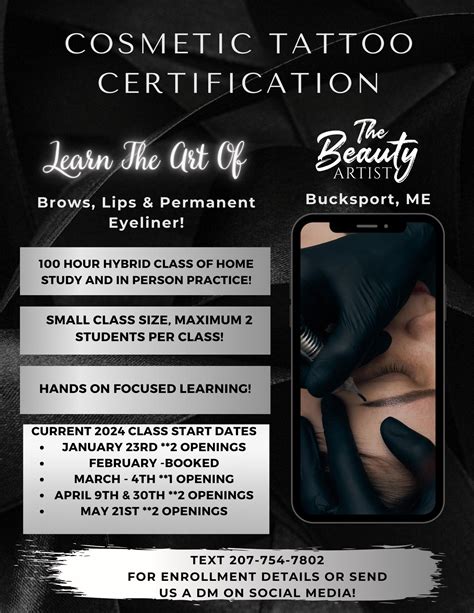Become a Certified Cosmetic Tattoo Artist: Your Guide to a Rewarding Career
The beauty industry is booming, and within it, permanent makeup—also known as cosmetic tattooing—is experiencing explosive growth. Becoming a certified cosmetic tattoo artist offers a lucrative and creatively fulfilling career path, but it requires dedication, training, and a commitment to excellence. This comprehensive guide will walk you through the essential steps to becoming a successful and certified professional in this exciting field.
What is Cosmetic Tattooing?
Cosmetic tattooing, or micropigmentation, is a specialized technique involving the implantation of pigments into the dermis layer of the skin. Unlike traditional tattoos, cosmetic tattooing focuses on enhancing natural features, such as eyebrows, eyeliner, and lips, creating a more defined and polished look. This procedure offers a semi-permanent solution, requiring touch-ups every 1-3 years depending on factors like skin type and lifestyle.
Why Choose a Career in Cosmetic Tattooing?
The demand for skilled cosmetic tattoo artists is high, offering numerous advantages:
- High earning potential: Certified artists can command competitive rates, especially as experience and expertise grow.
- Creative freedom: You'll be able to express your artistic talents while helping clients feel confident and beautiful.
- Flexible work arrangements: Many artists choose to work independently, setting their own hours and managing their own businesses.
- Strong client relationships: Building rapport with clients and helping them achieve their desired look fosters loyal customer bases.
- Continuous learning and growth: The industry is constantly evolving, providing opportunities for advanced training and specialization.
How to Become a Certified Cosmetic Tattoo Artist: A Step-by-Step Guide
Becoming a certified cosmetic tattoo artist involves several crucial steps:
1. Research and Choose a Reputable Training Program
This is the most critical step. Look for programs accredited by recognized organizations and offering comprehensive curriculum covering:
- Safety and hygiene protocols: Sterilization techniques, infection control, and bloodborne pathogen training are paramount.
- Anatomy and physiology: Understanding skin structure is vital for safe and effective tattooing.
- Pigment theory and color selection: Mastering color mixing and choosing appropriate pigments for different skin tones is crucial.
- Machine operation and techniques: Proper use of tattoo machines and various techniques like microblading and shading is essential.
- Business management: Learning how to run a successful business, including marketing, client management, and financial planning, is crucial for long-term success.
- Practical application: Hands-on training with models is crucial to develop skills and confidence.
2. Complete Your Training and Practice Extensively
Dedication and practice are key to mastering the art of cosmetic tattooing. Practice on artificial skin and participate in as many practical sessions as possible during your training. After completing the program, continue honing your skills through additional practice.
3. Obtain Your Certification
Upon successful completion of your training program, you'll receive your certification. The specific requirements for certification vary depending on the training institution and your location, so ensure you understand these requirements beforehand.
4. Build Your Portfolio and Marketing Strategy
Start building a strong portfolio showcasing your best work. High-quality photos of your work are essential for attracting clients. Develop a marketing strategy that includes social media, online presence, and networking within the beauty industry.
Frequently Asked Questions (FAQ)
How long does it take to become a certified cosmetic tattoo artist?
Training programs typically last several weeks to a few months, depending on the intensity and curriculum. Continuous learning and practice are crucial beyond the initial training.
How much does cosmetic tattoo training cost?
Costs vary significantly depending on the program's length, reputation, and location. It's wise to research different options and compare prices.
Is there a licensing requirement for cosmetic tattoo artists?
Licensing requirements vary greatly by state and country. Research your local regulations and ensure you meet all legal requirements before practicing.
What are the best types of pigments to use?
Choosing high-quality, hypoallergenic pigments from reputable suppliers is essential for client safety and achieving the desired results.
How can I find clients as a newly certified cosmetic tattoo artist?
Building a strong online presence, networking, and offering competitive introductory prices are excellent strategies for attracting initial clients.
Conclusion
Becoming a certified cosmetic tattoo artist is a rewarding journey that requires dedication, training, and a passion for the beauty industry. By following these steps and continuously honing your skills, you can build a thriving and successful career in this exciting and growing field. Remember to prioritize client safety, ethical practices, and continuous learning to achieve long-term success.

